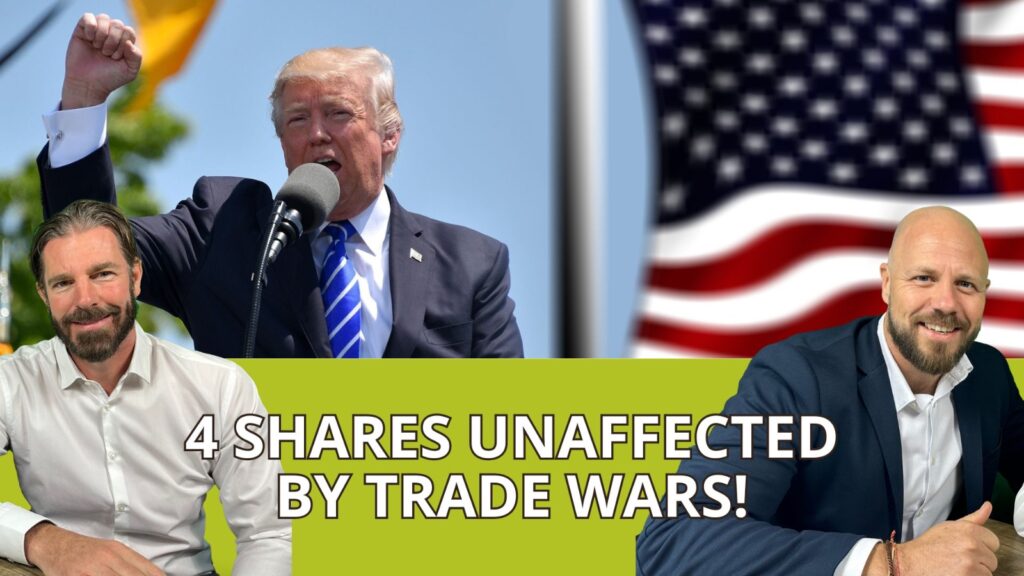Building a Fortress Portfolio: Defensive Stocks 2025 That Stand Strong in Trade Wars
Recent geopolitical developments in 2025 have once again placed tariffs and trade wars in the spotlight. U.S. President Donald Trump recently announced a 25% tariff on the EU, 25% on all steel imports, and 10% on China, with other countries such as Canada and Mexico in his crosshairs, reigniting discussions on how these economic measures impact global markets. While those invested in various sectors and markets brace for potential negative price movements, some defensive stocks remain largely unaffected by these tensions, making them attractive for investors seeking stability.
In this article, we explore a selection of defensive stocks in 2025 that could serve as defensive plays for investors and hedging exposed positions amid escalating trade disputes. These businesses operate within their local markets, shielding them from cross-border tariff risks, making them prime candidates for a “fortress portfolio” strategy.
Why Invest in Defensive Stocks in 2025
When tariffs are imposed, industries that rely heavily on imports and exports tend to experience volatility. However, companies with a strong domestic focus, resilient demand, and minimal exposure to international trade tend to weather these storms more effectively. Defensive stocks, especially those in sectors like financial services, healthcare, and essential consumer goods, provide a hedge against market turbulence.
We have identified four companies that fit this profile across different regions and industries.
1. Greggs, United Kingdom (GRG:xlon)
Greggs, a UK-based bakery chain founded in 1951, has transformed from a traditional bakery into a dominant player in the “food on-the-go” market. The company has expanded its breakfast and snack offerings while adjusting store hours to cater to busy commuters. Unlike retailers heavily reliant on imported goods, Greggs sources most of its ingredients domestically.
Key Highlights:
- Operates over 2,500 stores across the UK.
- Trades at 15 times earnings, making it fairly valued.
- Successfully pivoted toward on-the-go food offerings, boosting revenue streams.
- Expanded its footprint within large retail locations, including a flagship store inside Primark.
Because Greggs operates within the UK and does not depend on international trade, it remains insulated from tariff-related disruptions. It’s a defensive stock with consistent consumer demand, regardless of geopolitical developments.
2. Redeia Corporacion (formerly Red Eléctrica), Spain (RED:xmce)
For investors seeking stability in the utilities sector, Red Eléctrica offers a compelling opportunity. Founded in 1985, this Spanish energy company focuses exclusively on electricity transmission, with a significant portion of its revenue coming from domestic operations.
Key Highlights:
- 57% of Spain’s electricity now comes from renewable sources, positioning Red Eléctrica as a key player in the transition to green energy.
- The Spanish government holds a 20% stake in the company, ensuring regulatory stability.
- International operations are focused on Latin America (Peru, Chile, and Brazil), avoiding direct U.S. tariff risks.
- The company maintains a consistent dividend payout, making it attractive for income-focused investors.
- Trades at €16.55 per share, with a price target of €19, reflecting potential upside.
Because utilities remain an essential service, Red Eléctrica is a relatively low-risk investment, particularly for those looking to avoid trade-related market swings.
3. Tong Ren Tang, China (03613:xhkg)
Founded in 1669, Tong Ren Tang is one of the oldest pharmaceutical companies in the world, specialising in traditional Chinese medicine (TCM). Unlike major pharmaceutical giants that rely on global supply chains, Tong Ren Tang operates almost exclusively within China, making it impervious to international tariff disputes.
Key Highlights:
- Generated $650 million in revenue in the first half of last year, with $219 million in profits.
- Solely focused on the Chinese market, limiting exposure to trade-related disruptions.
- Trades at 13 times earnings, making it relatively affordable compared to global pharmaceutical peers.
Currently listed on the Shanghai Stock Exchange, with a planned dual listing in Hong Kong.
For investors looking at stable healthcare plays without trade war risks, Tong Ren Tang is a compelling choice.
If you are interested in undervalued opportunities in high-potential markets, we recommend you see our analysis on Why 2025 Could Be the Year for Chinese Stocks
4. Flow Traders, Netherlands (FLOW:xams)
While most investors seek stability through traditional defensive sectors, an alternative approach is to consider companies that thrive in volatile market conditions. One such company is Flow Traders, a Dutch market maker specialising in liquidity provision for exchange-traded funds (ETFs), options, bonds, and currencies.
Key Highlights:
- One of the few financial firms that benefits from market volatility.
- Trades across multiple asset classes, ensuring diversified revenue streams.
- Recently posted its second-best quarter in 20 years, reflecting strong performance in turbulent markets.
- Generates revenue by providing liquidity, regardless of whether markets rise or fall.
For investors looking to hedge against volatility while avoiding direct trade war risks, Flow Traders offers an intriguing opportunity.
Honourable Mention: TSMC, Taiwan (TSM:xnys)
Although not immune from the threat of tariffs and an export-oriented multinational, we would like to mention the Taiwan Semiconductor Manufacturing Company (TSMC) for completely different reasons from the stocks we have discussed. The chip giant is the dominant player in semiconductor industry and makes the most advanced computer chips in the world, that are inside everything from your iPhone to the aeroplanes overhead. The company is relatively insulated from the direct impact of tariffs.
Given its position, any additional costs from tariffs or trade restrictions would likely be passed on to customers, as there are no viable substitutes for its cutting-edge technology. Essentially, if the company is impacted by tariffs it can raise its price however it wishes and, well, too bad, there is nothing anyone can do about it.
While geopolitical risks and supply chain disruptions remain concerns, TSMC’s pricing power and critical role in global semiconductor production make it less vulnerable to the kind of tariff-driven pressures that affect more competitive industries.
If you are interested in further exploring this relatively undervalued and resilient stock, we recommend you see our analysis on whether TSMC is still a buy?
Final Thoughts: Defensive Stocks 2025
In times of uncertainty, building a fortress portfolio requires careful stock selection. Companies that operate domestically, provide essential services, or thrive in volatile conditions offer investors protection against market swings driven by policy decisions such as tariffs, and other geopolitical developments.
Key Takeaways for Investors:
- Greggs (UK) benefits from steady demand in food services, independent of global trade disruptions.
- Redeia (Spain) operates in the essential utilities sector, providing stability and reliable dividends.
- Tong Ren Tang (China) remains unaffected by trade wars due to its domestic focus on traditional medicine.
- Flow Traders (Netherlands) profits from market volatility, making it a unique defensive play.
By adopting a strategic approach in 2025 and focusing on defensive stocks with minimal exposure to trade risks, investors can create a resilient portfolio that weathers economic uncertainty while maintaining long-term growth potential.
As always, investors should conduct their own research and assess how these defensive plays align with their broader investment objectives.
If you’d like to further explore how to fortify your portfolio with more defensive positions, contact us an schedule a visit our office on Marbella’s Golden Mile.
We wish all investors a successful 2025! Trade Saf€.

Kaspar Huijsman
Kaspar is a passionate investor known for his thorough analysis of news and market
dynamics. With over 25 years of experience in the financial world, he never relies on half- truths and always prioritizes knowledge.
“An investment in knowledge pays the best interest.”
— Kaspar Huijsman
The information in this article should not be interpreted as individual investment advice. Although Hugo compiles and maintains these pages from reliable sources, Hugo cannot guarantee that the information is accurate, complete and up-to-date. Any information used from this article without prior verification or advice, is at your own risk. We advise that you only invest in products that fit your knowledge and experience and do not invest in financial instruments where you do not understand the risks.

